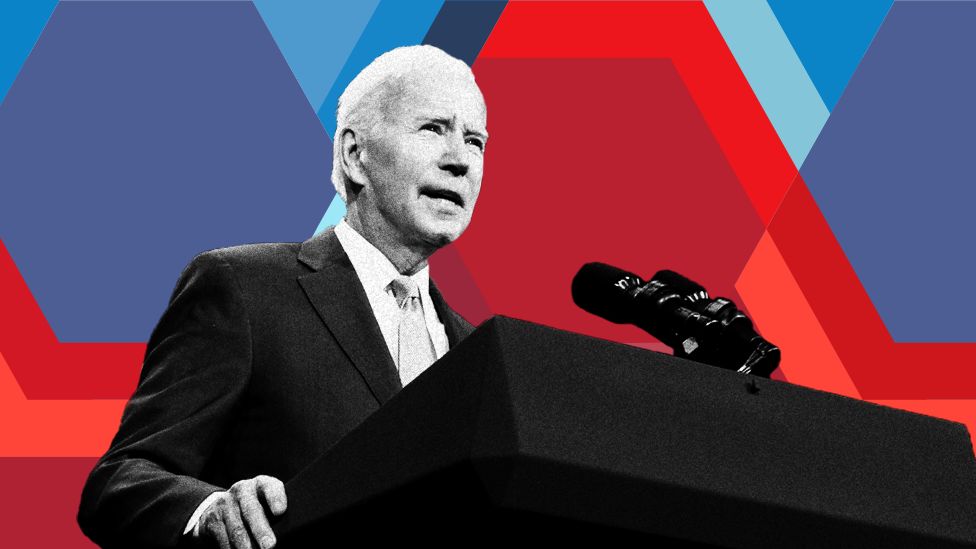US midterm elections: Why are they so important?
The US elections on 8 November will have an enormous impact on the direction of the nation, as well as the fate of the person and the party in power in the White House.
Joe Biden is not on the ballot – the midterms decide who controls Congress as well as state legislatures and governor’s offices. But the elections will give voters an opportunity to indirectly express their views on his presidency and the current direction of the country.
With the US economy struggling and voters concerned about crime and undocumented immigration, the verdict could be a harsh one for the current president. What’s more, the outcome will influence the playing field for the 2024 presidential campaign, and especially the odds of Donald Trump running again.
Here are five reasons why these elections are so important:
1. Abortion rights or restrictions
Reshaping Congress can directly influence the day-to-day lives of Americans across the country. Abortion is a good example.
In June the Supreme Court overturned constitutionally protected abortion rights. Both parties have already proposed new nationwide laws if they win control of Congress in the midterms.
Democrats promise to uphold women’s rights to have an abortion while Republicans have proposed a national ban on abortion after 15 weeks of pregnancy.
At a state level, the outcome of key governor and local races in traditional political battlegrounds like Pennsylvania, Wisconsin and Michigan could mean further abortion restrictions being imposed there.

Who wins control of Congress and who gains power in the states will also impact what other policies are focused on besides abortion.
If Republicans prevail, expect immigration, religious rights and addressing violent crime to be a priority.
For Democrats, the environment, healthcare, voting rights and gun-control will continue to remain high on the agenda.
2. The turn of Republicans to investigate Democrats
The midterm elections will have an impact well beyond policy circles, however.
Controlling Congress means having the power to launch committee investigations.
For two years, the Democrats have limited the amount of scrutiny the White House has faced and made the 6 January attack on the US Capitol in 2021 a primary focus.
They have interviewed hundreds of people and held primetime hearings into what happened that day, in an attempt to find out what the Trump White House knew in advance and how it responded. They are expected to publish a report before the end of the year.
But all this seems poised to change. Republicans, who are already anticipating control of the House of Representatives, say they will shut down the January 6 committee and launch a hearing into Joe Biden’s son Hunter’s business ties to China.
They also want to look into the Biden administration’s immigration policies, the US withdrawal from Afghanistan and the origins of the coronavirus pandemic in China.
If Republicans also take control of the US Senate, expect the process for confirming people Biden picks to work in federal courts and key government agencies to grind to a standstill.
3. Joe Biden’s future
Midterm elections are typically considered a referendum on the first two years of a presidential term – with the party in power often taking a beating.
Mr Biden’s approval ratings have been poor for more than a year. While Democratic fortunes appeared to have recovered over the summer, high inflation and concerns about the economy have reasserted themselves in the midterm campaign’s final stretch, leaving Democrats with an uphill battle to hold both chambers of Congress.
In his first two years as president, Mr Biden has pushed through new laws on climate change, gun-control, infrastructure investment and child poverty despite his narrow majorities in Congress.
If one of those chambers switches to the Republicans, however, they would have the power to stop Democratic bills from being passed by Congress and the result would be gridlock.

A poor night for Democrats would quickly be interpreted as a sign of Mr Biden’s continued political weakness – and could renew calls for Mr Biden to step aside for another Democrat when the 2024 presidential campaign season begins.
The president and his advisers insist he will seek re-election, however, and unseating a sitting president in a primary election – when candidates from the same party compete for the nomination – has happened only once in the modern political era.
4. Whether Trump runs again
Unlike recent defeated presidents, Mr Trump has not left politics quietly.
He appears to still harbour interest in returning to the White House in 2024 – and the midterms could strengthen his hand or dash his hopes. While he’s not on the ballot, dozens of his chosen candidates are running in high-profile races across the US.
The former president was able to elevate some Senate candidates, like former football player Herschel Walker in Georgia, television doctor Mehmet Oz in Pennsylvania and populist author JD Vance in Ohio, over more traditional Republican politicians, despite the objections of elder Republican leaders.
If they win, it could prove that his political instincts are sharp – and his brand of conservative politics has national appeal. But if Republicans fall short in Congress, and it’s because of the failure of Mr Trump’s unconventional handpicked candidates, the former president could shoulder the blame.
Such an outcome would boost the hopes of Mr Trump’s presidential rivals within the party. Both Florida Governor Ron DeSantis and Texas Governor Greg Abbott are up for re-election in November, and could use the results as a springboard for their own campaign to win the Republican nomination in 2024.
5. Will election deniers be running elections?
The 2022 midterms will be the first federal elections since the 6 January attack on the US Capitol, when Trump supporters tried to stop Joe Biden’s election victory from being certified.
Far from being chastened by the riot, Mr Trump has continued to question the results of that election and has actively supported Republican candidates who say a Trump win was stolen from them.
Many of these candidates, like secretary of state nominees Mark Finchem in Arizona and Jim Marchant in Nevada and governor candidate Doug Mastriano in Pennsylvania, are running for offices where they will have at least some control over their state’s electoral systems heading into the 2024 presidential contest.
These politicians, if elected, could refuse to certify their state’s election results in a close election.
They could also join lawsuits against localities based on allegations of electoral corruption, or enact new rules and regulations curtailing certain methods of voting, such as by mail or through ballot drop boxes.
In 2020, under pressure from Mr Trump to reverse some of the results, Republican officeholders in multiple states refused to bow to his demands.
Two years from now, if a similarly contested election takes place, the outcome of these kinds of challenges could be quite different.
